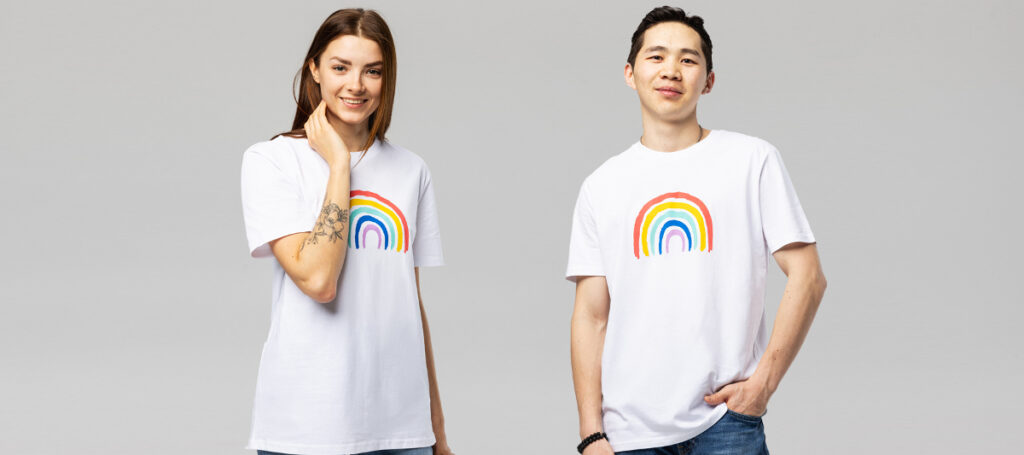The best sustainable men’s activewear for the gym, hiking, swimming and more…
Founder of Pitod, a genderless ethical slow fashion brand, Pedro Trajano explains to us why keeping Pride front and centre is more important than ever, and why he likes to emphasise what the word actually means – being able to be truly proud of who we are.

The sentiment that Pride should be celebrated all year round, and not only during June, as Pride month, rings more true than ever before.
Having a dedicated month to the celebrations of Pride is important and powerful, and certainly has gone a long way to raising awareness and acceptance for the LGBTQ+ community. Yet, we’re seeing as summer wanes, Pride begins to fall from our mind, sight and inevitably, our actions.
This is becoming more worrying as the LGBTQ+ community is facing an increasing amount of roll backs worldwide. In the UK, it was the Supreme Court ruling in April refusing to include trans women in the definition of a woman, while Europe is showing signs of becoming increasingly less tolerant as Hungarian prime minister, Viktor Orban, effectively tried to ban Pride, while Trump’s anti-DEI (diversity, equality and inclusivity) America has grown exponentially and is impacting support for Pride worldwide.
Why year-round support is important
It’s because of this backdrop that showing solidarity with marginalised groups, who can often feel on the fringes of society, is an important act all year round.
“At Pitod, we believe in celebrating every identity every day, because visibility isn’t just powerful, it’s life changing,” says Pedro Trajano, founder of the genderless slow fashion brand. “Pride isn’t a season, it’s a commitment we make every morning.”
Though Pedro agrees that raising awareness during Pride month has many positives, and the move into the mainstream is welcomed, he argues that the significant reduction in corporate support his year – with 75 per cent of Pride events across the UK reporting a decline in corporate sponsorships – suggests that some corporate sponsorship has been little more than virtue signalling. “Where is their support now that it matters arguably more than ever?” he asks.
This is a potentially valuable lesson to learn – if the commercialisation of Pride came at the cost of diluting its protest roots, then now the community and its supporters can get back to focusing on what Pride actually is.
Pedro argues we need to demand this of everyone involved in all events. “The origins of Pride are a protest movement rallying against ‘the norms’, so it’s not supposed to only be a one-off party that helps your brand to look good,” he says.
What are the protest roots of Pride?
The roots of Pride go back to 1969 after a protest broke out, known as the Stonewall Riots, in New York City. It followed a police raid on the Stonewall Inn, a gay pub, which was a common occurrence at the time, and it was this event that’s seen as a catalyst moment in LGBTQ+ activism.
The protests then began to grow legs in the UK in 1972, a time when same-sex couples could be arrested for showing affection in public. Activist and gay rights campaigner, Peter Tatchell, was a key figure in the British movement and who is still, at the age of 73, an avid campaigner and activist.

The true meaning of Pride today
Pedro’s keen to highlight that there’s a much deeper sentiment and meaning to Pride today, too.
As well as it being about raising awareness and making connections, he’s adamant that support should go further – it should encourage people to take actions, beginning with helping to change attitudes. “The goal is to change the way society thinks towards anyone that’s not straight or white,” he says. For him, it’s about reinforcing the idea that “it doesn’t change our lives if someone’s different from us”.
Supporting Pride and what it stands for 12 months of the year helps “change people’s lives everyday,” he says. This simple act of “accepting people for whoever they want to be,” is hugely important for people who can often feel left out, ignored and rejected.
“The goal is for us to be happy with ourselves,” he adds. That is the true meaning of the word ‘pride’ – “it’s about being proud of who we are… nothing else matters apart from that”.
Shop Pitod’s inclusivity range here, or Pitod’s wider collections here
Main image: Photo by Raphael Renter | @raphi_rawr on Unsplash


